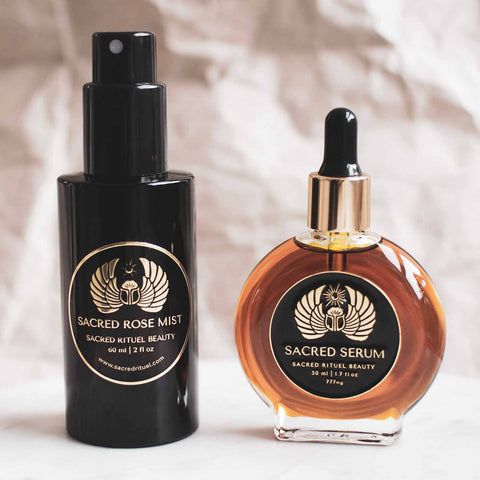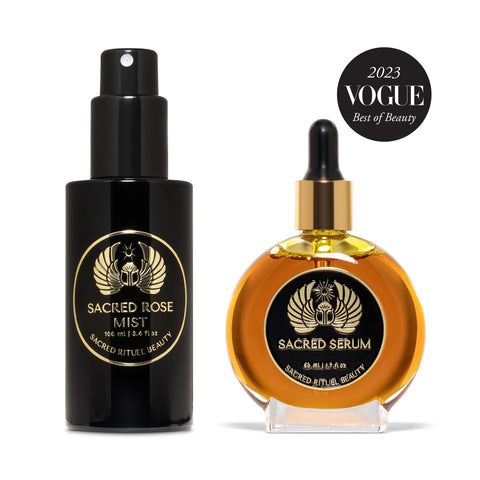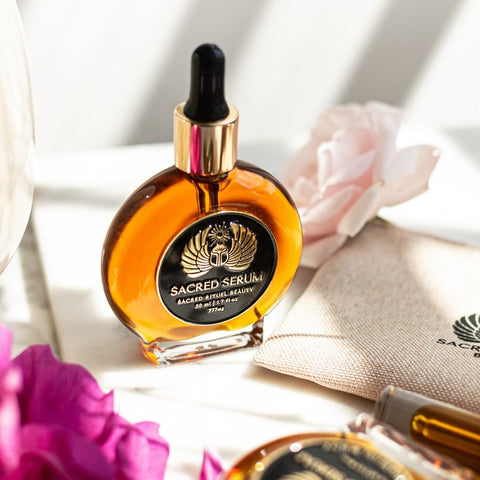Face Oil Treatment For Acne
Face oil and acne might sound like a risky combination at first. After all, isn’t oil the enemy of clear skin? Surprisingly, the right face oils can actually help balance your skin, reduce breakouts, and promote a healthier complexion. For those with acne-prone skin, understanding which oils to use—and which to avoid—can make a huge difference in your skincare routine.
Products formulated with Arnica to address reduce skin inflammation, bruising, and swelling.

Key Takeaways:
- Face Oils Can Benefit Acne-Prone Skin: The right non-comedogenic face oils help balance oil production, reduce inflammation, and nourish the skin without causing breakouts.
- Sacred Serum is a Powerful Ally: Sacred Serum combines organic, cold-pressed oils and botanicals to hydrate, protect, and heal acne-prone skin while offering SPF 10 sun protection.
- Choose Oils Wisely: Opt for lightweight, anti-inflammatory, and non-comedogenic oils while avoiding heavy or pore-clogging options like coconut or mineral oil.
Why Use Face Oil For Acne-Prone Skin?
It’s a common misconception that acne-prone skin should steer clear of oils altogether. The reality is that certain oils can actually benefit your skin by restoring balance and addressing the root causes of acne. Here’s how:
Replenishes The Skin’s Natural Barrier
Acne treatments, like salicylic acid or benzoyl peroxide, often strip away not just excess oil but also the natural lipids that protect your skin. Without these lipids, your skin can become dry, irritated, and even more prone to damage and breakouts. Face oils, especially those rich in essential fatty acids, help restore this barrier, improving hydration and resilience without clogging pores.
Balances Oil Production
When your skin feels too dry, it responds by producing even more oil to compensate, which can lead to clogged pores and acne flare-ups. Lightweight oils, like jojoba oil, closely mimic the skin’s natural sebum and can “trick” the skin into producing less oil. This balancing act leaves your skin less greasy over time while also reducing the risk of breakouts caused by overproduction.
Anti-Inflammatory Properties
Acne isn’t just about clogged pores; it’s also an inflammatory condition. Oils like rosehip and chamomile contain natural anti-inflammatory compounds that soothe redness and reduce swelling. This calming effect can help active breakouts heal faster while making your skin look and feel less irritated overall.
Antibacterial Benefits
Acne-causing bacteria, like Cutibacterium acnes, thrive in clogged pores, making antibacterial solutions essential in fighting breakouts. Unlike harsh chemical treatments, antibacterial oils can target bacteria without compromising your skin’s microbiome, which plays a role in maintaining overall skin health.
Top Oils That Help Combat Acne
Not all face oils are created equal, especially when it comes to acne-prone skin. Here are some powerhouse oils known for their acne-fighting properties:
Jojoba Oil
Jojoba oil is a go-to for acne-prone skin because it mimics the skin’s natural sebum, helping to regulate oil production. It’s lightweight and doesn’t sit heavily on the skin, so it won’t clog your pores. Additionally, it has anti-inflammatory properties that can reduce redness and calm active breakouts, making it an all-around soothing option.
Rosehip Oil
Rich in vitamins A and C, rosehip oil supports skin regeneration and helps fade acne scars over time. Its lightweight texture makes it easy for the skin to absorb without leaving a greasy residue. With its ability to even out skin tone and promote healing, it’s an ideal choice for addressing both active acne and post-acne marks.
Marula Oil
Marula oil stands out for its high concentration of omega fatty acids and antioxidants, which protect the skin from environmental stressors. It’s lightweight yet incredibly nourishing, helping to reduce redness and irritation. Thanks to its quick absorption, it hydrates the skin without leaving a greasy finish, making it suitable for acne-prone individuals who need extra moisture.
How Sacred Serum Supports Acne-Prone Skin
Sacred Serum combines multiple benefits into a single product, streamlining your skincare routine. It works as a moisturizer, sun protector, and skin healer, all while providing a natural, healthy glow.
Restores Balance To Acne-Prone Skin
Sacred Serum is formulated to regulate oil production, a crucial factor for acne-prone individuals. The inclusion of jojoba oil, rosehip seed oil, and hemp seed oil ensures your skin is hydrated without clogging pores. These oils mimic your skin’s natural sebum, reducing the overproduction of oil that can lead to breakouts.
Anti-Inflammatory Powerhouse
Inflammation is a key driver of acne, causing redness, swelling, and discomfort. Sacred Serum harnesses the power of ingredients like hemp extract, sea buckthorn fruit oil, and calendula to calm the skin and reduce irritation. By soothing inflammation, these components create a healthier environment for the skin to heal and prevent future breakouts, all while leaving your complexion more even-toned and less irritated.
Protects And Nourishes
Sun exposure can worsen acne scars and trigger breakouts, but Sacred Serum provides an organic solution with natural SPF 10. Ingredients like blackberry seed oil and pomegranate seed oil protect your skin from UVA and UVB rays without the use of harsh chemicals or minerals. Alongside sun protection, the serum delivers a rich supply of antioxidants and vitamins that nourish your skin, making it stronger and more resilient against daily stressors.
Promotes Skin Healing And Cell Renewal
Sacred Serum supports your skin’s natural ability to regenerate by delivering a blend of antioxidants, fatty acids, and vitamins. Powerful ingredients like amla fruit oil, tocotrienol oil (Vitamin E), and camellia seed oil encourage cell renewal, which helps fade acne scars and improve texture over time. By replenishing the skin on a cellular level, the serum ensures you wake up with healthier, more vibrant skin every day.
Gentle Enough For Sensitive Skin
Many acne treatments are harsh and drying, often causing more harm than good. Sacred Serum uses cold-pressed, organic oils that retain their full nutritional value, ensuring they remain gentle and non-irritating. This makes the serum a reliable choice for even the most sensitive skin types, offering the benefits of hydration and healing without causing reactions or discomfort.
Creating A Skincare Routine With Face Oil
Incorporating a face oil into your skincare routine might seem daunting at first, especially if you have acne-prone skin. However, with the right steps, you can enjoy the benefits of Sacred Serum and other oils while maintaining a healthy, glowing complexion. Here’s how to build an effective skincare routine:
Start With A Clean Slate
Begin your routine by washing your face with a gentle, non-comedogenic cleanser designed for acne-prone skin. This removes dirt, sweat, and makeup without disrupting your skin’s natural barrier. Avoid harsh cleansers that leave your skin feeling tight or dry, as they can trigger your skin to produce more oil to compensate.
Tone To Balance Your Skin
After cleansing, apply a toner to rebalance your skin’s natural pH and remove any leftover residue. Choose an alcohol-free toner with soothing ingredients like green tea or rose water, which won’t irritate your skin. This step ensures your face oil can absorb effectively and evenly into your skin.
Apply Sacred Serum
Take 2-3 drops of Sacred Serum and warm it between your fingertips before gently pressing it onto your skin. Focus on areas prone to dryness or breakouts, as Sacred Serum’s anti-inflammatory ingredients help calm irritation while balancing oil production. Massage in upward circular motions to enhance absorption and boost circulation for a radiant glow.
Sun Protection For Daytime
When using Sacred Serum in the morning, remember that its SPF 10 provides a light level of sun protection. For extended periods outdoors, layer a broad-spectrum sunscreen with SPF 30 or higher on top to shield your skin from harmful UVA and UVB rays. This is essential because sun exposure can worsen acne scars and lead to premature aging.
Evening Skincare
At night, Sacred Serum doubles as a repair treatment, nourishing your skin while you sleep. Cleanse your face thoroughly to remove the day’s buildup, then apply Sacred Serum to boost your skin’s natural healing and regeneration process. Its rich nutrients and antioxidants work overnight to repair damage, calm inflammation, and promote a smoother complexion.
Be Consistent And Patient
Using face oil isn’t a one-time fix; consistency is key to seeing results. Sacred Serum supports your skin’s natural 27-day renewal cycle, so visible improvements may take some time, especially for persistent acne or scars. Stick with your routine daily, and you’ll notice a healthier, more radiant complexion over time.
Oils To Avoid If You Have Acne
While some oils can work wonders for acne-prone skin, others may exacerbate the problem by clogging pores or increasing inflammation. Knowing which oils to avoid is crucial for maintaining clear and healthy skin. Here’s a list of oils that acne-prone individuals should steer clear of:
- Coconut Oil: Although moisturizing, coconut oil is highly comedogenic, meaning it can clog pores and lead to breakouts. It’s best avoided on the face, especially if your skin is prone to acne.
- Wheat Germ Oil: Wheat germ oil is rich in nutrients but also ranks high on the comedogenic scale. Its thick texture can trap dirt and bacteria in pores, causing irritation and acne.
- Palm Oil: Often found in skincare products, palm oil has a waxy consistency that can be too heavy for acne-prone skin. It has the potential to block pores and create a barrier that traps impurities.
- Mineral Oil: A byproduct of petroleum, mineral oil is often used in skincare as a cheap moisturizer. However, it can clog pores and disrupt the skin’s natural oil balance, leading to breakouts.
- Lanolin Oil: Derived from sheep’s wool, lanolin oil can be highly comedogenic for certain skin types. While it’s effective for very dry skin, it’s not suitable for those prone to acne.
- Olive Oil: Though natural, olive oil is thick and can create a film on the skin that traps bacteria and clogs pores. It’s better suited for body care rather than facial application on acne-prone skin.
- Synthetic Fragrance Oils: Fragrance oils, often used for their pleasant scents, can irritate sensitive or acne-prone skin. They may not clog pores directly but can trigger inflammation and worsen acne symptoms.
Additionally, check product labels for "non-comedogenic" or "suitable for acne-prone skin." By avoiding these oils and opting for lightweight, non-comedogenic options like those in Sacred Serum, you’ll minimize breakouts and support your skin’s health.
Read also:
- Why Acne Leads To Persistent Hyperpigmentation
- What To Do To Heal Raw Skin On Your Face Overnight
- How Skin Balancing Toners Work And Why You Need One
Frequently Asked Questions About Face Oil For Acne
Which face oil is best for acne?
Jojoba oil and rosehip oil are among the best face oils for acne-prone skin. They are non-comedogenic, balance oil production, and have anti-inflammatory or antibacterial properties. Sacred Serum, which combines several of these oils, is also an excellent choice for acne-prone individuals.
Which oil is good for acne?
Hemp seed oil is a standout choice due to its lightweight texture, high omega-3 and omega-6 fatty acids, and anti-inflammatory benefits. It helps balance sebum production without clogging pores. Rosehip oil is another effective option, especially for reducing acne scars.
Should you use face oil at night or morning?
Face oil can be used both in the morning and at night, depending on your routine. In the morning, it can provide hydration and protection, while at night, it works to repair and nourish the skin. For best results, apply it after cleansing and toning, allowing it to absorb fully.
Does oil affect acne?
The wrong oil can clog pores and worsen acne, but the right oil can help balance sebum production and soothe inflammation. Non-comedogenic oils like jojoba are beneficial for acne-prone skin. Choosing the right oil is key to avoiding breakouts.
What oil is best for acne scars?
Rosehip oil is highly effective for reducing acne scars due to its vitamin A and essential fatty acids. Sea buckthorn oil is another excellent option, as it promotes cell regeneration and reduces hyperpigmentation. Regular use can help improve skin texture and fade scars over time.
Which skin treatment is best for acne-prone skin?
A consistent routine featuring gentle cleansers, non-comedogenic oils, and targeted treatments like salicylic acid or benzoyl peroxide works best for acne-prone skin. Sacred Serum, with its blend of healing botanicals, can complement this routine by balancing and soothing the skin. Regular exfoliation with mild acids can also prevent clogged pores.
Is it OK to leave oil on face overnight?
Yes, leaving non-comedogenic face oils like jojoba or hemp seed oil on overnight can deeply hydrate and repair the skin. These oils absorb well and won’t clog pores, making them safe for extended use. Always patch-test new products before leaving them on overnight.
How to apply face oil correctly?
Start with clean, toned skin, then take 2-3 drops of oil and warm it between your palms. Gently press the oil onto your face and neck, focusing on areas prone to dryness or irritation. Allow the oil to absorb fully before applying sunscreen or makeup.
Can I use facial oil daily?
Yes, you can use facial oil daily as part of your skincare routine. Lightweight, non-comedogenic oils are safe for everyday use and provide hydration and balance to the skin. Adjust the frequency based on your skin’s needs and sensitivity.
What heals acne scars fast?
Topical treatments with rosehip oil, vitamin C, or retinoids can help fade acne scars. Regular exfoliation with AHAs or BHAs accelerates cell turnover and promotes scar healing. Consistent use of hydrating products like Sacred Serum can also improve skin texture over time.
Which oil is best for removing dark spots?
Rosehip oil is excellent for reducing dark spots due to its vitamin A and antioxidant content. Pomegranate seed oil is another great option, as it promotes cell renewal and reduces pigmentation. Combined with sunscreen, these oils can help prevent new dark spots.
Which body oil is best for acne-prone skin?
Hemp seed oil and jojoba oil are great for acne-prone skin on the body, as they hydrate without clogging pores. Tea tree oil, when diluted, can also help treat body acne effectively. Sacred Serum can be used for targeted areas requiring extra care.
SACRED TRIO | SERUM + ROSE TONER + BODY OIL
Prix régulier$229.00 Prix de solde

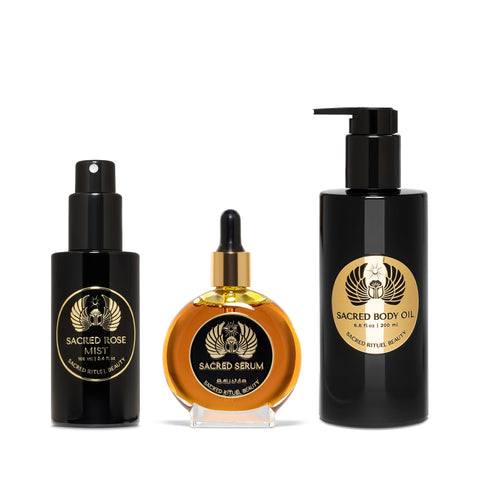

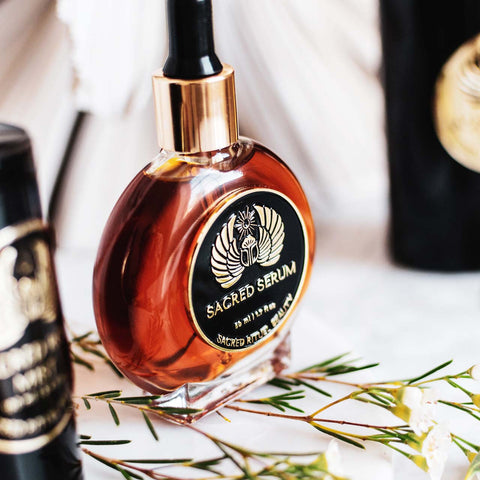
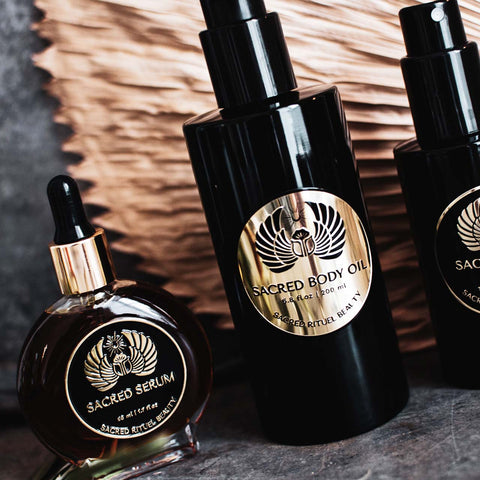
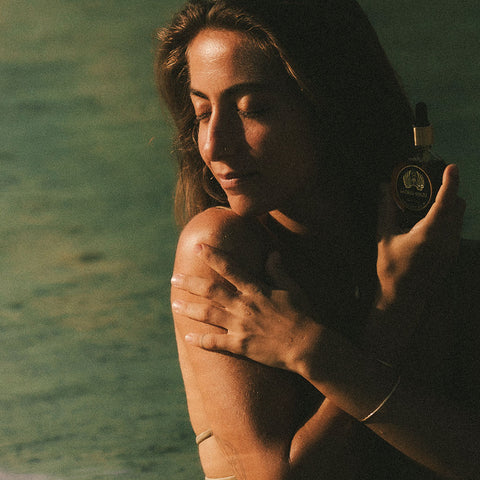
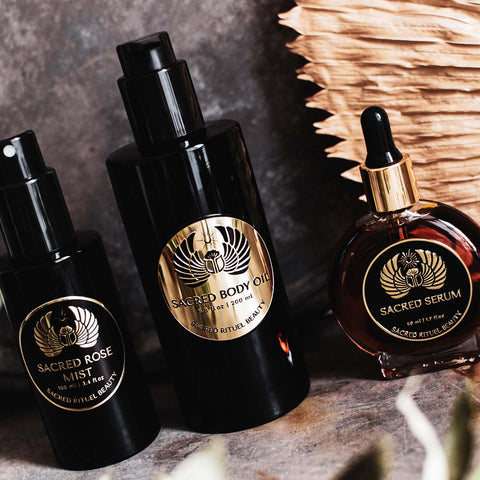
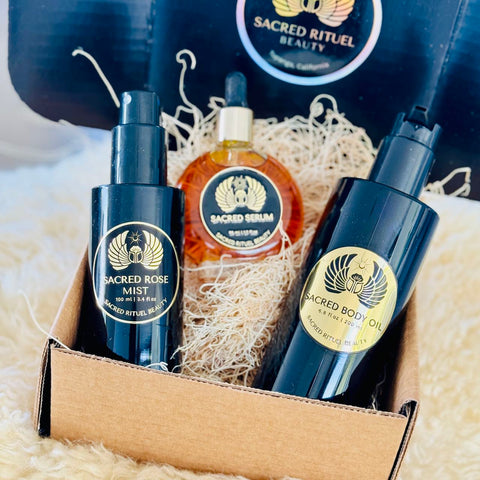
All Day Glow Essentials
Livraison express gratuite sur les commandes de plus de 100 $
Dépensez 100 $ et obtenez la livraison express GRATUITE. Dépensez 50 $ et obtenez la livraison standard GRATUITE. Livraison économique de 5 $ sur toutes les autres commandes.
Détails dans notre politique d'expédition .
Livraison automatique avec abonnement
Assurez-vous d'avoir TOUJOURS un flux constant de SACRED RITUEL à portée de main !
Détails dans notre page d'abonnements .
Retours sans tracas sous 30 jours
Essayez SACRED RITUEL pendant 30 jours et renvoyez-le pour un remboursement complet s'il ne répond pas complètement à vos attentes.
Détails dans notre politique de retour .
RITUEL SACRÉ est
Soins de la peau bio à haute puissance
Bulletin
Restez connecté sur les conseils de bien-être, les ventes exclusives et les événements !

